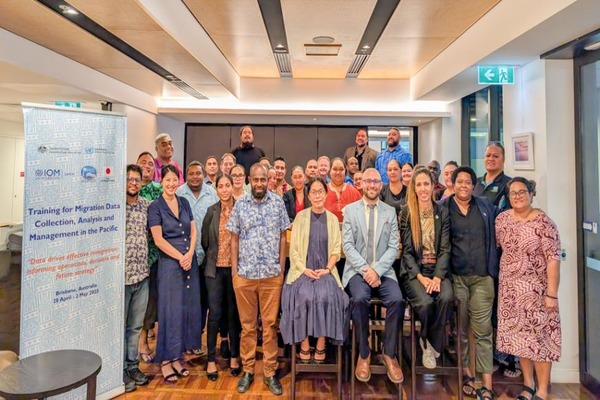Brisbane – Immigration officials from 20 Pacific countries convened in Brisbane from April 28 to May 2, 2025, for a vital training programme focused on migration data collection, analysis, and management. Hosted by the Pacific Immigration Development Community (PIDC), the International Organization for Migration (IOM), and the United Nations Office on Drugs and Crime (UNODC), the five-day workshop equipped 34 participants with enhanced data capabilities.
The Pacific region faces increasing cross-border movement due to factors like trade expansion, educational pursuits, labour mobility, tourism, natural disasters, health crises, and climate change impacts. Recognizing the critical role of immigration data in managing these flows, the training aimed to bolster regional capacity for evidence-based immigration operations and policymaking.
The training covered fundamental aspects of data literacy, including understanding various immigration data types and sources, utilizing different intelligence types, cycles, and techniques, engaging with data through visualization, analyzing data to identify risks and threats, and reasoning to explain the significance of data. The emphasis was the importance of eliminating bias in data collection and analysis to ensure accurate and reliable data-driven decisions.
Participants were also introduced to the regional irregular migration trends on cybercrimes, key regional threats, and emerging maritime movement trends by subject matter experts, stressing the importance of quality data for risk assessment and investigation.
The training also featured discussions on the Reporting and Information Sharing Platform (RISP), a pioneering online tool developed by PIDC and IOM. RISP facilitates the sharing of regular migration data among Pacific countries, offering data visualization tools to better understand and monitor regional cross-border movements.
‘Effective migration management hinges on reliable data. This training strengthens our collective ability to gather, analyze, and share information, enabling us to better anticipate and respond to migration trends across the Pacific,” said Akuila Ratu, Head of Secretariat, PIDC.
Recognizing that data plays a central role in driving immigration operations and guiding evidence-based policy making, participants acknowledged the necessity of strengthening national data collection processes and promoting data uniformity across the region to effectively identify and anticipate migration patterns.
This initiative was primarily funded by the Government of Japan under the “Enhancing Capacity of Border Control for Responding to Infectious Diseases in Pacific Island Countries” project, with co-funding from UNODC’s Pacific Islands Transnational Organised Crime Programme, supported by the Australian Department of Foreign Affairs and Trade (DFAT).
***
For more information, please contact:
- Akuila Ratu, Head of Secretariat, Pacific Immigration Development Community (PIDC), Apia, Samoa at: akuila.ratu@pidcsec.org
- Kazumi Nakamura, Programme Manager, International Organization for Migration (IOM), Apia, Samoa at: knakamura@iom.int
- Matthew David Watson, Regional Advisor for Transnational Organised Crime and Cybercrime, United Nations Office on Drugs and Crime (UNODC), Suva, Fiji at: matthew.watson@un.org

